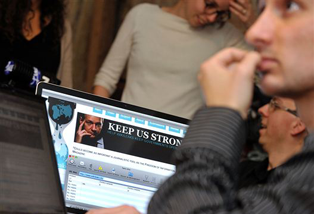Interpresnews
Just like their peers around the world, Russian journalists have been writing extensively about the revelations contained in the secret U.S. diplomatic cables released by WikiLeaks, Europe Bureau of the Radio “Liberty” wrote.
In at least one publication, the resulting stories have been quite extraordinary. In fact, according to some skeptical observers, the scoops appear too good to be true.
“Unlike other media sources, who published the materials of the WikiLeaks, the Ruski Reporter did not provide any documents to prove its arguments,” wrote the author.
The journalist mentioned the statement of Yulia Latynina, one of several Russian journalists to have voiced doubts over the credibility of "Russky reporter," who said. "This allegation is left hanging in the air, to put it mildly."
Russia is not the only country whose media have been accused of misrepresenting WikiLeaks material. The growing scrutiny of "Russky reporter" comes as several major Pakistani newspapers admitted publishing stories based on fake WikiLeaks.
Much of the criticism against "Russky reporter" focuses on an article analyzing secret communications penned by U.S. diplomats in Tbilisi during the Russia-Georgia war in August 2008.
"When I first read the utter nonsense about events in Georgia, I immediately went and read the real cables, and I saw that this was a complete deception and falsification," says Leonid Velikhov, the editor of Russia's "Sovershenno sekretno" newspaper. "Everything had been distorted."
In the article, Editor in Chief Vitaly Leibin writes that the leaked U.S. documents show that most governments believed that Georgian President Mikheil Saakashvili started the war, and that "no one in the world had any illusions" otherwise.
In reality, the cables released by WikiLeaks show the opposite.
“A cable sent from the U.S. Embassy in Tbilisi says that "all the evidence available to the country team supports Saakashvili's statement that this fight was not Georgia's original intention."
According to "The New York Times," the cables actually reveal that U.S. diplomats relied heavily on the Georgian government's information and largely failed to challenge its account of the war in their cables to Washington.
"Russky reporter's" translation of U.S. cables posted on its website is at times also misleading.
For example, the magazine quoted a remark in the cables by the U.S. ambassador in Riga that Latvian authorities blame Russia for starting the war but felt "Tbilisi has been looking for a provocation to act." But when the comment was translated into Russian, it misleadingly read: "Tbilisi provoked in order to act,” the publication reads.
"Russky reporter," a glossy medium-circulation magazine owned by the Kremlin-friendly Expert publishing group, has similarly been accused of withholding cables critical of Russian leaders.
"Russky reporter" claims to be one of the few media outlets that were given early access to WikiLeaks' quarter-million U.S. cables. Only four media organizations, however, are known to be collaborating directly with WikiLeaks: "The Guardian" in Britain, "Le Monde" in France, "El Pais" in Spain, and "Der Spiegel" in Germany.
Unlike "Russky reporter," these newspapers have carried stories relating exclusively to cables that have been simultaneously released by WikiLeaks and coordinated with the publication in question.
http://foreignpress.ge/?p=15893
See the full text: http://www.rferl.org/content/wikileaks_misinformation_critics_allege_russian_magazine_misrepresenting_cables/2247274.html
News
December 13, 2023
Ethnic minorities outside the peace dialogue
November 6, 2023
‘Peace’ agenda of political parties
Popular
Articles
February 13, 2024




